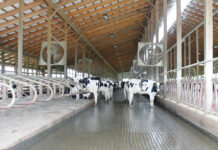LONDON, Ohio — There was plenty of opportunity during the 2000 Farm Science Review to tap into the minds of The Ohio State University ag economists.
A panel of ag economists kicked off the Review Tuesday with a discussion of current events, and a steady stream of public one-on-one interviews with economists and rural sociologists was offered each day of the Review at the Alumni Park.
Topics ran the gamut from land values to trade issues and from the next farm bill to large-scale livestock operations.
In the free-flowing exchange of ideas, Carl Zulauf threw down the gauntlet with this statement: “There is no reason livestock has to be in Ohio. The industry has to make its own way.”
Ohio consumers, he explained, can easily pay for beef imported from someplace else. “We do now,” Zulauf said. “We’re a net importer of meat.”
“I’m simply posing an unthinkable question,” he shrugged.
Zulauf is not the only person scrutinizing the future of Ohio’s livestock sector. As livestock operations get larger, consumers and agricultural producers alike are wondering if Ohio will put out the welcome mat or turn the cold shoulder.
What frustrates Zulauf is the seeming lack of ag industry cohesiveness and leadership in Ohio. Even though farmers are independent, he said, the success of agriculture rests on Ohio agriculture as an industry, not individual Ohio farmers.
“There will always be livestock in Ohio, “Zulauf clarified,” but there may not be a livestock industry.”
“Are we prepared to allow it to happen? Are we prepared to stop it? Do we have a plant to stop it?” Zulauf asked.
Zulauf and his panel partners also tackled land values and farmland preservation issues. But the economists offered little optimism for a meaningful farmland preservation plan, even as the state offers a bond plan to finance brownfield redevelopment and farmland preservation as Issue I on November’s ballot.
It’s a great idea, but who’s going to pay for it?” asked ag economist Lynn Forster. “I don’t think we’re willing to do that.”
Zulauf gives an Ohio farmland preservation plan “zero probability of being effective,” partially because the ag community itself is divided on the issue.
“You find more support among nonfarmers than farmers,” Zulauf said.
“We’re going to talk about it, but we’re not going to do anything about it.”
Get 4 Weeks of Farm and Dairy Home Delivered









